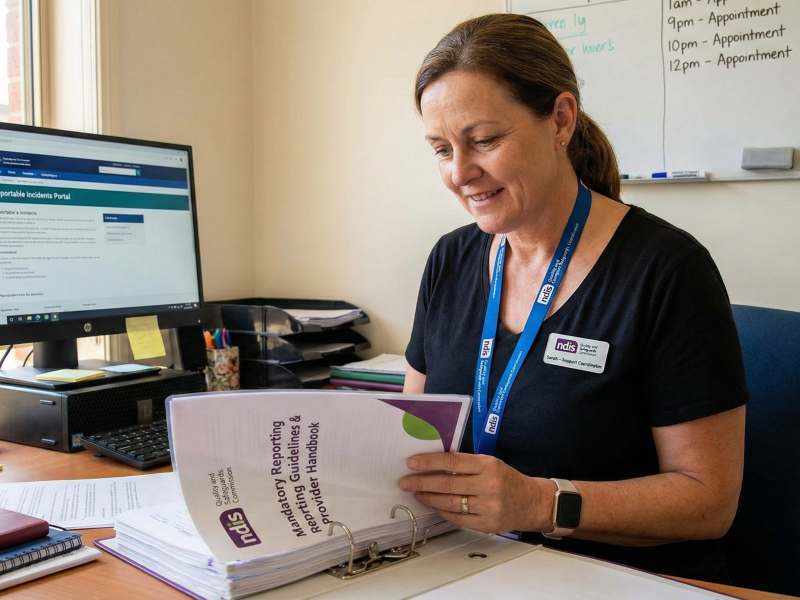The National Disability Insurance Scheme (NDIS) is Australia’s national framework for supporting people with disability, designed to give Participants greater choice and control over the services they receive. For Providers, it opens the door to delivering impactful, person-centred supports that help individuals achieve their goals and lead more independent lives.
While the scheme is administered by the National Disability Insurance Agency (NDIA), which is responsible for managing Participant plans and funding approvals, it is the NDIS Quality and Safeguards Commission that Registered Providers primarily engage with. The Commission is the independent regulator that oversees the conduct of NDIS Providers, ensuring they comply with the NDIS Practice Standards, uphold Participant rights, and maintain high-quality and safe service delivery.
For business owners, allied health professionals, and sole traders, becoming a Registered NDIS Provider offers a meaningful way to make a difference in your community. This article explains how to become an NDIS Provider—and how Avaana can guide you through the NDIS Registration process every step of the way.
What NDIS Providers Do?
NDIS Providers provide a variety of services aimed at helping people with disabilities reach their goals and improve their quality of life. The function of an NDIS Provider is to ensure Participants are provided services and supports in line with their plans while upholding high levels of care, professionalism, and adherence to NDIS rules.
Services may include personal care, therapies, assistive technology, transport, and home modifications. Providers can be independent or work within an organisation, providing individualised support according to Participant needs.
Who Is Eligible To Become a Registered NDIS Provider?
Those applying to become Registered NDIS Providers need to meet certain eligibility criteria, including:
- Qualifications: NDIS Providers must have relevant qualifications and/or meet experience requirements that match the disability support services they plan to deliver. The Provider
- Suitability Criteria: The NDIS Provider and their Key Personnel (eg Directors, Managers) must meet pre-determined suitability criteria. This criteria includes suitability questions such as whether the Applicant business or Key Personnel have been convicted of an indictable offence, has been insolvent or under administration, or has ever been disqualified from managing corporations under the Corporations Act 2001.
Types Of NDIS Providers
The NDIS Quality and Safeguards Commission (NDIS Commission) oversees the quality and safety of NDIS services and supports. They regulate offerings from Registered and Unregistered Providers.
Registered Providers
Registered Providers are considered the gold standard among NDIS Providers. They are premium as they meet Registration requirements set by the NDIS Commission, including ongoing compliance auditors with Commission-approved quality approved auditors.
Registered Providers undergo an approval process; including a suitability assessment and complex audit a spart of the Registration process. It takes a certain level of commitment for a Provider to complete the Registration process, however, Registration broadens the scope of services and supports that can be provided and those Participants that can be serviced.
On the other hand, achieving Registration can be completed easily through the help of Avaana, making the process less tedious and quicker!
Unregistered Providers
Unregistered Providers are not registered with the NDIS.
They may offer some types of services to Participants but have limited opportunities. This is because some support categories do not require Registration.
Pros and Cons of Registered and Unregistered Providers | ||
|---|---|---|
Registered Providers | Unregistered Providers | |
Pros ➕ |
|
|
Cons ➖ |
|
|
How To Become An NDIS Provider
The following steps outline the process for Registration with the NDIS Commission:
Step 1: Fill out the Online Application Form
You will have to provide the below-mentioned details:
- Organisation’s contact details
- Business structure
- Registered business address and postal address
- Key personnel and the relevant suitability criteria of each
- Relevant Registration groups or classes of support
- Business self-assessment with NDIS Practice Standards
Step 2: Submit the Application
You must submit the Application within 60 days or it will be deleted and you will need to start again.
Step 3: Choose an Approved Quality Auditor
You’ll need to engage the services of an approved quality auditor before moving on to the next step. Use the Initial Scope of Audit document generated from submission of the Application to request a quote.
Step 4: Complete the Audit
The external audit agency, known as a “Quality Approved Auditor”, will complete your audit and the results are submitted to the NDIS Commission for final assessment.
There are two types of audits:
- Verification audit
- Certification audit.
The type of audit you need depends on the kind of services and supports your business offers.
Step 5: Assessment by the NDIS Commission
The NDIS Commission will assess your Application, including the audit recommendation. They will notify you of the outcome.
Benefits of Becoming An NDIS Provider
Becoming an NDIS Provider offers some benefits, which are:
- Increased Business Opportunities: Tap into an expanding market of thousands of NDIS Participants seeking high-quality services.
- Financial Security: Guaranteed government funding, providing stable revenue streams.
- Positive Social Contribution: Play a role in enhancing the lives of individuals with disabilities by delivering necessary support.
- Professional Development: Improve your credentials and expertise in the disability market, resulting in career development and new opportunities.
All of this can fit into one line when you choose Avaana to take over your Registration Application process!
Should I Become An NDIS Provider?
Choosing to become an NDIS Provider relies on your purpose, skill, and willingness to provide quality services. If you’re interested in helping people with disabilities and willing to fulfil the necessary compliance and quality requirements, being an NDIS Provider is a fulfilling profession. Nevertheless, the Registration process takes time, effort, and strict adherence to guidelines. Assessing your capacity and level of preparation is crucial before commencing the Application process.
Conclusion
NDIS Providers play a vital role in ensuring people with disabilities are provided with the necessary services and supports to reach their goals and improve their quality of life.
Both Registered and Unregistered Providers play a role in the space. Without their love, dedication, care and expertise, the NDIS could not function.
Are you interested in becoming a Registered NDIS Provider but still unsure? The team at Avaana provides expert business advice and specialises in helping eligible businesses quickly get NDIS Registered.
FAQs
What is an NDIS Provider?
An NDIS Provider is an individual or an organisation that provides services and supports to NDIS Participants to attain their goals and enhance their quality of life. Providers need to follow rigorous NDIS standards and guidelines to provide quality care.
What are the eligibility criteria to become an NDIS Provider?
Eligibility requirements differ depending on the services offered. In general, Providers must have the qualifications and experience to meet NDIS quality and safety requirements. Registered Providers also need to undergo an audit process.
How long does it take to become a Registered NDIS Provider?
The timeline is subject to the level of complexity in the Application and audit process. On average, it takes several weeks to a few months to be approved after the audit recommendation has been submitted. Since this is the better option when compared to staying an Unregistered NDIS Provider, the wait-timeline.
What are the duties of an NDIS Provider?
NDIS Providers are obligated to provide quality services, adhere to NDIS standards and guidelines, keep proper records, and promote Participant well-being. They are also obliged to adhere to the NDIS Code of Conduct and meet reporting requirements.
How much does NDIS Registration cost?
The total Registration fee varies with the services provided and the audit process. Lower-risk Provider verification audits can cost approximately $1000, whereas certification audits for higher-risk services are more costly.
How long does NDIS Registration take?
NDIS Registration timelines vary with the Application process, completion of audits, and review periods. While some Applications are completed within a few months, others may take longer to align with the regulations.


